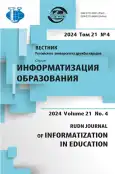Возможности применения иммерсивного обучения на основе абстрактных высоко формализованных математических моделей для подготовки будущих учителей математики
- Авторы: Матвеева В.А.1, Заславская О.Ю.2,3
-
Учреждения:
- Сахалинский государственный университет
- Московский городской педагогический университет
- Российский университет дружбы народов
- Выпуск: Том 21, № 4 (2024)
- Страницы: 488-500
- Раздел: ВЛИЯНИЕ ТЕХНОЛОГИЙ НА РАЗВИТИЕ ОБРАЗОВАНИЯ
- URL: https://journal-vniispk.ru/2312-8631/article/view/321360
- DOI: https://doi.org/10.22363/2312-8631-2024-21-4-488-500
- EDN: https://elibrary.ru/SKQJBS
- ID: 321360
Цитировать
Полный текст
Аннотация
Постановка проблемы. Иммерсивные технологии становятся сегодня визитной карточкой современного образовательного процесса, позволяя пользователю погрузиться в виртуальную среду, создать ощущение присутствия и вовлеченности за счет высокой степени интерактивности и реалистичности аудиовизуальных эффектов. Динамические модели представляют математическое описание поведения системы во времени в различных областях. В контексте применения иммерсивного обучения на основе абстрактных высоко формализованных математических моделей для подготовки будущих учителей математики динамические модели обеспечивают основу для создания интерактивных и правдоподобных виртуальных сред. «Наблюдение» абстрактной высоко формализованной математической модели - сложный динамический процесс, который согласован с ее поведением в процессах реального мира, причем данные процессы не всегда возможно визуализировать. Цель исследования - описание технологии «слабое иммерсивное обучение». Методология. Поставленная проблема рассмотрена на примере раздела математики «Теория чисел». В качестве наблюдаемой модели выбрана асимметричная система шифрования RSA. Для приближения изучаемой модели к реальной ситуации применена система компьютерной алгебры Maxima. Результаты. В процессе изучения математической модели криптосистемы RSA и ее реализации в системе компьютерной алгебры Maxima у студентов возникает «частичное» погружение в изучаемую среду, поскольку для наблюдения результатов необходимо знать математическую модель и ряд функций, способных обеспечить определенный результат. Тем не менее, педагогический процесс сопровождается следующими принципами: погружение в контекст, интерактивность, персонализация, мотивация, оценка, доступность. Заключение. Рассмотренную технологию можно назвать «слабое иммерсивное обучение», поскольку визуальные эффекты и создание компьютерной модели требуют от студентов непосредственного участия и теоретического знания предмета.
Об авторах
Валентина Александровна Матвеева
Сахалинский государственный университет
Автор, ответственный за переписку.
Email: matveeva89.ru@mail.ru
ORCID iD: 0000-0002-8184-2028
SPIN-код: 5042-5102
кандидат педагогических наук, доцент кафедры математики, Институт естественных наук и техносферной безопасности
Российская Федерация, 693008, Южно-Сахалинск, Коммунистический пр., д. 33Ольга Юрьевна Заславская
Московский городской педагогический университет; Российский университет дружбы народов
Email: zaslavskaya@mgpu.ru
ORCID iD: 0000-0002-6119-8271
SPIN-код: 9496-6568
доктор педагогических наук, профессор, профессор департамента информатизации образования, Институт цифрового образования, Московский городской педагогический университет; профессор кафедры сравнительной образовательной политики, Учебно-научный институт сравнительной образовательной политики, Российский университет дружбы народов
Российская Федерация, 129226, Москва, 2-й Сельскохозяйственный проезд, д. 4, корп. 1; Российская Федерация, 117198, Москва, ул. Миклухо-Маклая, д. 6Список литературы
- Muravyova AA, Oleynikova ON. Immersive learning – a promising technology, or a passing trend? Kazan Pedagogical Journal. 2023;1(156):120–129. (In Russ.) https://doi.org/10.51379/KPJ.2023.158.1.012
- Matveeva VA, Voronyuk YuD. Modeling as a meaning-forming phenomenon when solving problems in mathematics. In: Child in the modern educational space of a metropolis: Proceedings of the VIII International Scientific and Practical Conference, 25–26 March 2021, Moscow. Moscow: Moscow City University; 2021. p. 205–209. (In Russ.)
- Matveeva VA, Samsikova NA. The system of professional tasks as a means of developing professional competencies for future teachers of mathematics in the course of mastering the discipline “Algebra and Number Theory”. Prepodavatel XXI vek. 2023;4(1):118–125. (In Russ.) https://doi.org/10.31862/2073-9613-2023-4-118-125
- Okeyinka AE. Computational speeds analysis of RSA and ElGamal algorithms on text data. In: Proceedings of the World Congress on Engineering and Computer Science, 21–23 October 2015, San Francisco, USA. Vol. I. Newswood Limited; 2015. p. 115–118.
- Shores D. The evolution of cryptography through number theory. URL: https://www.gcsu.edu/sites/default/files/documents/2021-06/shores.pdf (accessed: 15.07.2024)
- Vostokov SV, Vostokova RP, Bezzateev SV. Number theory and applications in cryptography. Chebyshevskii Sbornik. 2018;19(3):61–73. (In Russ.)
- Koblitz N. Course of number theory and cryptography. Zubkova AM (ed.). Trans. from English by Mikhailova MA, Tarakanova VE. Moscow: TVP; 2001. (In Russ.)
- Zaslavskaya OYu. Analysis of approaches to the transformation of education in the context of the development of immersive and other digital technologies. Vestnik of Moscow City University. Series: Informatics and Informatization of Education. 2020;3(53):16–20. (In Russ.) https://doi.org/10.25688/2072-9014.2020.53.3.02
- Zaslavskaya OYu. How learning is changing: the transformation of education in the context of the development of digital technologies. In: Informatization of education and methods of e-learning: digital technologies in education: Proceedings of the IV International Scientific Conference, 6–9 October 2020, Krasnoyarsk. Part 2. Krasnoyarsk: Siberian Federal University; 2020. p. 426–430. (In Russ.) https://elibrary.ru/item.asp?id=44034452
- Shutikova MI, Shumova VV. Fundamentals of training modern teachers in the conditions of digital transformation of education. Pedagogical Informatics. 2023;1:265–275. (In Russ.)
- Grinshkun VV. (ed.) Modern {digital} didactics: monography. Vol. 2. Moscow: A-Prior LLC; 2023. (In Russ.) https://www.elibrary.ru/item.asp?id=60046236
- Baranova EV. (ed.) Integration of education in the field of natural and exact sciences: monography. St. Petersburg: Russian State Pedagogical University named after. A.I. Herzen; 2019. (In Russ.)
- Baranova EV. (ed.) Current problems of education in the field of natural and exact sciences: monography. St. Petersburg: Russian State Pedagogical University named after A.I. Herzen; 2018. (In Russ.)
- Podkhodova NS, Snegurova VI, Orlov VV. The evolution of assessment tools for the formation of the readiness of future mathematics teachers to professional activity. In: Development of general and vocational mathematical education in the system of national universities and pedagogical universities: Materials of the 40th International Scientific Seminar of Teachers of Mathematics and Informatics of Universities and Pedagogical Universities, 7–9 October 2021, Bryansk. Bryansk: Khudovets R.G. Publ.; 2021. p. 201–206. (In Russ.)
Дополнительные файлы









